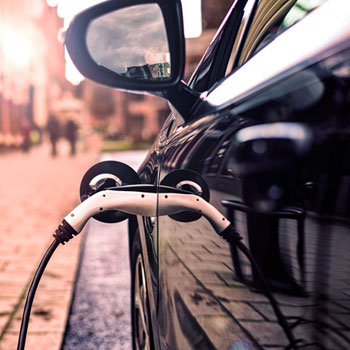Why does sustainability take so long?
'One of the issues is that building a sustainable world is not only about improving the climate. The current political and economic systems are inextricably linked to this, just like healthcare and - in a broader context - the importance of meeting fundamental human needs. This interrelationship between various factors makes the realisation of a sustainable world even more difficult in the short term.' As a lecturer at the Faculty of Science (Department of Environmental Sciences) at the Open Universiteit, Gibran Vita utilises his Biotech and Industrial Ecology background to focus mainly on these sub-domains of sustainability, particularly in combination with how they influence society.
Rays of hope
'Realising the climate goals has fallen behind schedule, especially in the wealthy countries. We continue to exceed planetary limits of all resources, including land, air, water and materials. One of the issues is that we choose to do what is simple, not what is urgent. For example, we seem to be more concerned about banning plastic bags from supermarkets than the huge amounts of micro plastics polluting the air and sea every day due to the wear and tear of car tyres. That is a fact. And of course, banning single-use plastic is also important. But it also draws attention disproportionately from other issues. On a global scale, the world is off-track to meet most of the Sustainable Development Goals (SDGs) set by the member states of the United Nations by year 2030. Two thirds of the poorer countries remain below the desired level of sustainability when it comes to basic needs such as poverty, sanitation and hunger. Whereas some of the wealthier countries are progressing towards economic and social goals, they are struggling to advance in environmental goals such as climate protection and biodiversity. The reason for this? According to many experts, too much focus on economic growth jeopardizes environmental goals. But there are also some rays of hope. Technological innovations are driving a rise in renewable-energy and the number of electrically powered vehicles, while at the same time more and more people are opting for a vegetarian diet and other lifestyle changes.'
Inertia of socio-economic systems
'The biggest obstacle to achieving a sustainable world at an accelerated pace is the inertia of socio-economic systems. That is the broad consensus among environmental scientists today. This is because these systems also attach great importance to economic growth and the continuous analysis and measurement of gross domestic product. Many people who care about the planet therefore advocate socio-economic changes and also emphasise the need to promote more sustainable lifestyles, especially in the West, but also in the Global South, which tend to pursue European lifestyles. No country in the world today can completely guarantee a good life for all its citizens. Not in the area of equality, democracy, healthcare, employment and neither in the subjective satisfaction with life or social support. Some countries, however, are doing it better than others. Residents in the Scandinavian countries, Netherlands and Germany, for example, enjoy a reasonably good quality of life.'
Progressive political thinking
'The same applies to Vietnam, Taiwan, Costa Rica and the Andean countries of Peru, Bolivia and Ecuador. These latter countries also boast progressive political thinking with the 'Buen Vivir' agenda or 'Living well'. Especially in the sense that there is an awareness that a growing economy is not the only thing of importance, but that we must prioritize the rights of the planet and the wellbeing of its human and non-human population. Many are therefore actively trying to put an end to climate change, deforestation, extreme poverty, inequality and injustice. This is an example of sustainability that goes beyond the economic-centric SDGs.'
Impact of consumption
'However, as mentioned, we still have a long way to go and need considerable time before we enter an age that is indeed actually 'sustainable'. Currently, I am carrying out research into the impact of consumption. How can we achieve higher wellbeing with less resources? And even more importantly: how can we positively influence consumption to the benefit of our planet and the people?'
About Gibran Vita
Gibran researches and advises on sustainability strategies for industries and cities. His goal is to transform organisations and businesses towards satisfying economic needs, while at the same time contributing to the sustainability of nature and communities. The research area he is working on, 'Socio-economic metabolism and industrial ecology', focuses on connecting environmental impact to societal outcomes. Resolving these complex issues involves a multifaceted approach, which includes data science, industrial ecology tools, social sciences, management, entrepreneurship and business development.






